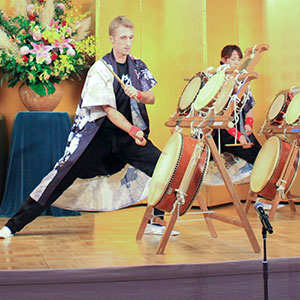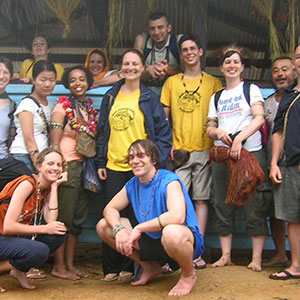Cultural knowhow aids strategic planning
Now in its 27th year, the Japan Exchange and Teaching (JET) Programme has welcomed over 55,000 people from 62 countries to deliver grassroots international exchange between Japan and other nations. Seventh in our series, this column features former JETs, both in the UK and Japan, who keep the idea of fostering mutual understanding firmly at heart.
Perhaps surprisingly—given the extent to which Japan has become a part of my life—I did not apply to the Japan Exchange and Teaching (JET) Programme because of a long-term interest in Japan.
Rather, after university, I heard about the scheme and jumped at the chance to do it. It was during the application process that my interest in Japanese culture and language grew.
On reflection, that was fortunate. I was placed in a rural part of Kumamoto Prefecture that became my home for three years, which were often joyful, sometimes frustrating, but always memorable.
Many evenings I would go to a bar and try my shaky Japanese on the customers. Incredibly patient with my attempts to communicate, they were both interested in me and interesting. What is more, they were always welcoming.
After three years, I spoke fluent conversational Japanese—with a distinctly rural Kumamoto accent—and I felt I belonged in the community.
After leaving the programme, I joined an English language school in Kumamoto City. However, on realising that I was finding the management aspects of the job particularly rewarding, I returned to the UK to study for an MBA.
That could have been the end of my professional relationship with Japan, but it was not. I spent a couple of years as a management consultant and felt I would like to incorporate my Japanese experiences into my career. So, when I was offered a job at Toyota Motor Manufacturing (UK) Ltd, I readily accepted.
It is not well recognised that the state of the UK’s motor manufacturing business today is something of a success story.
Production levels are the fourth highest among European countries and are projected to rise. Firms export to countries across the globe and investment continues in both motor plants and parts suppliers, while British factories have a reputation for high productivity, flexibility and quality.
A lot of the success of the industry can be contributed to the entry of Nissan Motor Co., Ltd., Honda Motor Company, Ltd and Toyota in the 1980s and ’90s. At present, around half the cars produced in the UK are made by Japanese firms.
More importantly, these firms invested not just in factories, but also in people. They committed to developing their respective workforces and those of their suppliers, reflecting Japan’s manufacturing philosophy that requires built-in quality, continuous improvement and the elimination of waste.
This means there is a high-quality workforce available to drive the entire industry forward.
While having learnt a lot at Toyota, those skills were built on the knowledge I acquired on the JET Programme.
My first role at Toyota was to arrange visits by top executives from Japan to the UK. My first-hand experience with Japanese culture was vital to project our firm’s feeling of omotenashi (the spirit of hospitality) to our visitors.
Today, I manage the Corporate Planning team, looking after strategic planning and corporate governance for Toyota’s UK manufacturing operations.
Knowledge of the Japanese way of working remains invaluable. Building consensus, for example, is a key part of Toyota’s DNA, as it is of Japanese culture. At best, it is a powerful way for a large organisation to make plans and execute them as a team.
At worst, it can seem like endless rounds of discussions going nowhere. Yet, as this cannot be avoided, understanding the culture helps me judge when the process is working well, and how to move it on when it is not. In that way, my time working in Japan is still a real part of my career.
While my current job is different from that which I held on the JET Programme, I would like to think there is something uniting both of them.
By having taught English in Japan and now by strengthening a Japanese manufacturer’s operations in the UK, I am part of the move to build and deepen links between the two countries.





